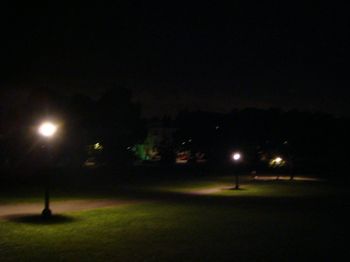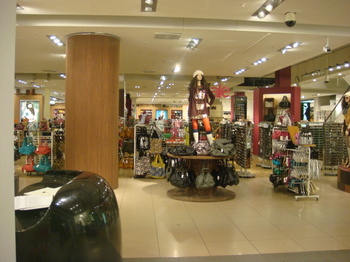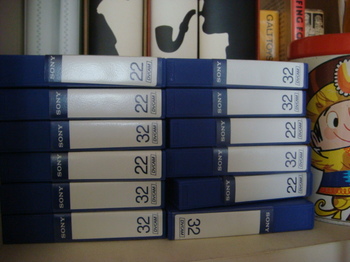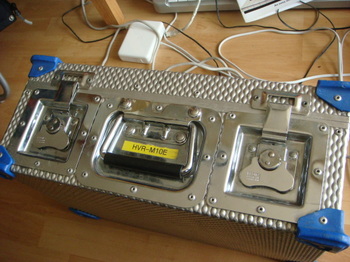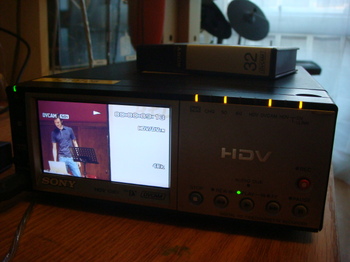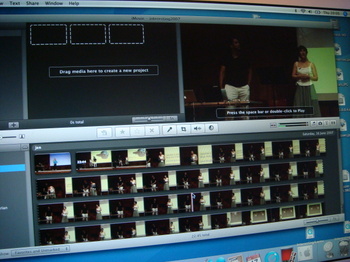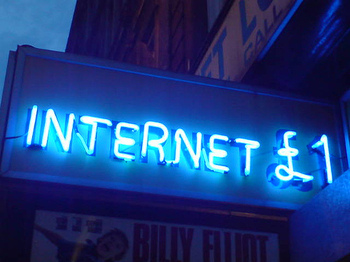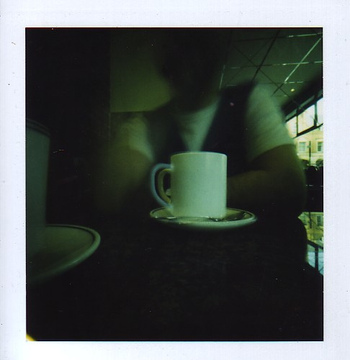Howies and Thoughtful are doing something interesting (and probably mischievous) at the organic food festival in Bristol in September. They're looking for some real life dohboys. If you fit the bill (or know someone who does) contact details are here. I hope it's not humiliating for some kid though, that would be bad.
Russell Davies
As disappointed as you are
About | Feed | Archive | Findings | This blog by email
« July 2007 | Main | September 2007 »
doh
August 22, 2007 in ideas | Permalink | Comments (0) | TrackBack (0)
adrian at interesting
Hats off to Adrian for this one. Blimey. He'd never done anything like this before and I made him go first. What a git I am. And he does a brilliant job with three minutes that absolutely set the right tone. As did Johnny with his compering (I've included a bit of that so you can see the pressure the speakers were under. Friendly pressure. But pressure.) And, also, full marks to the crowd - I asked them to be enthusiastic and they were.
We might have a way to get better sound on here, but it'll slow the posting process down a bit. What do we all think? Is this OK?
August 21, 2007 in interesting2007 | Permalink | Comments (7) | TrackBack (0)
looking for darkness
We climbed up Primrose Hill late last Sunday night, hoping to see the Perseids. We did everything wrong; early rather than late, the centre of London, and only hung around for a while (hard to keep a very tired 7-year old interested for long) but we still glimpsed a few. And it was rather magical.
And then, today, I read a brilliant article in the New Yorker about light pollution (abstract here, no full text online apparently). And it struck me that this might be one of those issues you could get people interested in. There'll have to be a huge bundle of ideas, actions and activities if we're going to get more responsible in our energy use - not one huge idea - and this might be one which catches people's imagination, because it seems to have everything going for it. Lighting the ground and not the sky saves money, increases safety and gives us back the stars.
Some points from the article:
Someone looking at the night sky over New York sees less than one percent of the stars that Galileo would have seen.
Installing 'full cutoff' lighting (ie lighting that shines where you want it, not up at the sky and not straight in your eyes) in public spaces can save huge amounts of money in energy bills because you can reduce the wattage per light.
And I really liked the fact that you can often increase visibility by decreasing the amount of lighting.
Because our eyes adapt to the brightest light present, if you've got a huge 'glare bomb' - an unshielded light - all it really does is create more darkness, because our eyes can't adapt to see anywhere other than the immediately illuminated area. (Doesn't there seem to a big juicy metaphor in there for something?) This often means that lights installed in the name of safety just end up creating huge pools of darkness for criminals to plot their dastardliness.
And there's a huge emotional pay-off - we'd be able to see the stars again. As opposed to the interior of Top Shop - which looks like this at night:
How is that amount of lighting necessary all night?
You can find out more at The International Dark-Sky Association, who have a splendid motto - Carpe Noctem.
August 21, 2007 in fmsg | Permalink | Comments (4) | TrackBack (0)
interesting video - andrew
So, here's a bit of video from Interesting2007. Three splendid minutes from Andrew Hovells. Many thanks to the folks at Ogilvy Digital Influence for filming everything for us. I have to apologise, the sound isn't great, though it's listenable. I think Curtis got better sound straight out of the desk so someone who's better at editing than I may be able to piece them together sometime. Meantime if anyone's got any ideas how I can make the audio clearer (with a few clicks in iMovie, which is what I am capable of) that'd be great.
I'm going to get everything I can up over the next few weeks, given my vimeo bandwidth. In no particular order. (I'm not sure what I'll do with the longer presentations, I was thinking of Brightcove, but does anyone have any other thoughts?) Then when they're all done, we'll stick them up on their own site as a permanent archive.
And for those who'd like it we'll also have just sound files too.
August 20, 2007 in interesting2007 | Permalink | Comments (2) | TrackBack (0)
interesting video
People have been asking me where all the video is from Interesting2007. Well, it's here:
Which obviously isn't really good enough. But, today, Steve was kind enough to get me a deal on the renting of one of these for the weekend:
Well, that's just the flight case. (I love flight cases)
That's the bit of gear, which enables me to get the video off the tapes and into here:
So that, hopefully soon, they'll be on this:
August 16, 2007 in interesting2007 | Permalink | Comments (1) | TrackBack (0)
steinski and mass
Every now and then there are three little piles of vinyl I reach for and plunge into nostalgia. The first is a fairly complete selection of KLF 12s which we won't go into now, the second is a big old collection of early Go-Go stuff (also not for today) and the third is a small mound of hip-hop singles I fell in love with - headed by We'll Be Right Back by Steinski and Mass Media. Steinski was a particular hero because he managed to be both influential in the history of hip-hop and have a job in advertising. But in that way that sometimes we're all too dense it never occurred to me to try and drag that affection out of the past and see what Mr Steinski et al was up to now. But yesterday while following links relating to dj/rupture I stumbled across Steve Steinski's blog and it's a marvelous thing. I've had a marathon listening to his shows on WFMU and you might want to too.
August 15, 2007 in thinking about music | Permalink | Comments (2) | TrackBack (0)
wide field of sound
One of the frequently noted good things about the webetc is the way otherwise fringe things can find a viable audience - it's especially excellent for odd audio stuff. But, mostly, to date, it's been about an offbeat artist sharing with lots of people, it's not been about lots of people contributing to the art. This excellent project from BLDGBLOG and DJ/rupture is a bit different. They've set up a voicemail account and they're asking you to use your phone to record various different soundscapes and ambiences. Find yourself somewhere sonically interesting? Call them up and dump it on their voicemail. And then they'll do interesting stuff with it on the radio. I really like that. Excellent idea. Another clever, simple, use of phones.
August 14, 2007 in radio | Permalink | Comments (1) | TrackBack (0)
what it's for
There's a been a bit of talk recently about a decline in blogging. It seems people are finding other things to do (facebook, twitter, etc) and aren't furiously posting all day. Probably a good thing. In fact definitely a good thing, because maybe we'll start to discover what it is that blogs are best for - what they're a uniquely good at. And I think I have a candidate - this lovely series of posts by Dan Hill, which he makes very clear are not about the birth of his son. Except they are. Which he admits as well.
I can't imagine these existing in any other form. Part memoir, part architectural essay, part sleep-deprived ramble, all lovely. The distance he inserts by talking about architecture makes it even more personal, so much so that I almost hesitate to link to it. (So I asked, isn't that pathetic?) But it's fantastic stuff and deserves to be read. Where else would you get something that's this personal, useful, interesting and immediate?
August 13, 2007 in sites | Permalink | Comments (2) | TrackBack (0)


